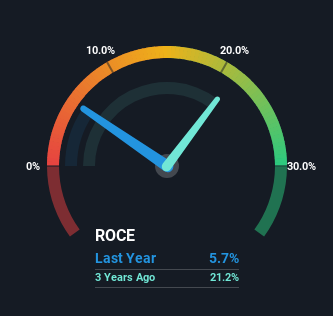- Hong Kong
- /
- Energy Services
- /
- SEHK:1960
Some Investors May Be Worried About TBK & Sons Holdings' (HKG:1960) Returns On Capital
What trends should we look for it we want to identify stocks that can multiply in value over the long term? Typically, we'll want to notice a trend of growing return on capital employed (ROCE) and alongside that, an expanding base of capital employed. Put simply, these types of businesses are compounding machines, meaning they are continually reinvesting their earnings at ever-higher rates of return. Although, when we looked at TBK & Sons Holdings (HKG:1960), it didn't seem to tick all of these boxes.
Understanding Return On Capital Employed (ROCE)
For those who don't know, ROCE is a measure of a company's yearly pre-tax profit (its return), relative to the capital employed in the business. Analysts use this formula to calculate it for TBK & Sons Holdings:
Return on Capital Employed = Earnings Before Interest and Tax (EBIT) ÷ (Total Assets - Current Liabilities)
0.057 = RM8.9m ÷ (RM192m - RM37m) (Based on the trailing twelve months to December 2022).
Therefore, TBK & Sons Holdings has an ROCE of 5.7%. Even though it's in line with the industry average of 6.4%, it's still a low return by itself.
See our latest analysis for TBK & Sons Holdings

Historical performance is a great place to start when researching a stock so above you can see the gauge for TBK & Sons Holdings' ROCE against it's prior returns. If you're interested in investigating TBK & Sons Holdings' past further, check out this free graph of past earnings, revenue and cash flow.
What Does the ROCE Trend For TBK & Sons Holdings Tell Us?
On the surface, the trend of ROCE at TBK & Sons Holdings doesn't inspire confidence. To be more specific, ROCE has fallen from 54% over the last five years. Although, given both revenue and the amount of assets employed in the business have increased, it could suggest the company is investing in growth, and the extra capital has led to a short-term reduction in ROCE. And if the increased capital generates additional returns, the business, and thus shareholders, will benefit in the long run.
On a related note, TBK & Sons Holdings has decreased its current liabilities to 19% of total assets. That could partly explain why the ROCE has dropped. Effectively this means their suppliers or short-term creditors are funding less of the business, which reduces some elements of risk. Since the business is basically funding more of its operations with it's own money, you could argue this has made the business less efficient at generating ROCE.
The Bottom Line
In summary, despite lower returns in the short term, we're encouraged to see that TBK & Sons Holdings is reinvesting for growth and has higher sales as a result. And the stock has done incredibly well with a 115% return over the last three years, so long term investors are no doubt ecstatic with that result. So should these growth trends continue, we'd be optimistic on the stock going forward.
Since virtually every company faces some risks, it's worth knowing what they are, and we've spotted 3 warning signs for TBK & Sons Holdings (of which 1 is significant!) that you should know about.
For those who like to invest in solid companies, check out this free list of companies with solid balance sheets and high returns on equity.
Valuation is complex, but we're here to simplify it.
Discover if TBK & Sons Holdings might be undervalued or overvalued with our detailed analysis, featuring fair value estimates, potential risks, dividends, insider trades, and its financial condition.
Access Free AnalysisHave feedback on this article? Concerned about the content? Get in touch with us directly. Alternatively, email editorial-team (at) simplywallst.com.
This article by Simply Wall St is general in nature. We provide commentary based on historical data and analyst forecasts only using an unbiased methodology and our articles are not intended to be financial advice. It does not constitute a recommendation to buy or sell any stock, and does not take account of your objectives, or your financial situation. We aim to bring you long-term focused analysis driven by fundamental data. Note that our analysis may not factor in the latest price-sensitive company announcements or qualitative material. Simply Wall St has no position in any stocks mentioned.
About SEHK:1960
TBK & Sons Holdings
An investment holding company, undertakes civil and structural works in the oil and gas industry in Malaysia and the People’s Republic of China.
Excellent balance sheet with low risk.
Similar Companies
Market Insights
Community Narratives


Recently Updated Narratives

Astor Enerji will surge with a fair value of $140.43 in the next 3 years

Proximus: The State-Backed Backup Plan with 7% Gross Yield and 15% Currency Upside.


A case for for IMPACT Silver Corp (TSXV:IPT) to reach USD $4.52 (CAD $6.16) in 2026 (23 bagger in 1 year) and USD $5.76 (CAD $7.89) by 2030
Popular Narratives


MicroVision will explode future revenue by 380.37% with a vision towards success


The company that turned a verb into a global necessity and basically runs the modern internet, digital ads, smartphones, maps, and AI.



